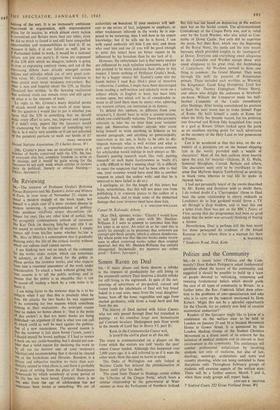a Reviewing .—The reviewer of Professor Grafta's Bohemia rsus Bourgeois
and Mr. Easton's Artist and Writers Paris, in your issue of November 27, claims to cal a modern malady of the book trade, but iself is a plain case of a more virulent diseaseln dem reviewing. A superabundance of publica- ns produces relatively minor discomforts (M- iran. for one), like any other kind of surfeit; but arrogantly contemptuous attitude of reviewers e Kay Dick (in denying him/her any title I do t intend to emulate his/her ill manners; I simply not tell from his/her name whether he/she is r., Mrs. or Miss) is a consumption that is gradually iining away the life of the critical faculty without tich our culture itself cannot survive.
I am thinking now not so much of the contempt ' the works under review, which can sometimes salutary, as of, that shown for the public in lose service the reviewer works, and who expects wrn him a reasoned assessment of the work under nsideration. To attack a book without giving rele- nt reasons is to tell the public nothing; and to sums that the public is so sheeplike that it can scared off reading a book by a rude noise is to suit it,
I am being fairer to the reviewer than he is to his hjccts when I say that this is precisely what he es. He attacks the two books he was supposed be reviewing for two reasons which contribute
■ thing to their evaluation: the principal reason ad he makes no bones about it: 'that is the point this review') is that too many books are being iblished—an argument (if that is what you can call which could as well be used against the publica- n of a new masterpiece. The second reason is at the reviewer is just plain bored ('yawn, yawn'). Should myself be bored, perhaps, if I had to review work on, say, cattle-breeding, but I should not coll- ier that a valid reason for declaring the work to all rot (to borrow one of your reviewer's licities) and recommending that it should be cleared t of the bookshops and libraries. Boredom is a Ivate and subjective reaction no more than acci-
aually related to what elicits it, and there is probably s piece of writing from the plays of Shakespeare )wnwards by which somebody at some period of s life has not been bored. Certainly there is no it who from the age of adolescence has not nuetimes been bored at something. We arc all
01 Sit( Pe in rev hin file tio to the lik no cat
wh to, be
ft( co va asi be ito
So to
Of PU
II(
a si
bj fe el
authorities on boredom. If your reviewer will indi- cate to me errors of fact, judgment or emphasis, or other weaknesses inherent in the works he is sup- posed to be reviewing, then I will bow to his expert knowledge; but if he tells me he is bored, I can with equal authority tell him I am not; and those who read him and me (if you will be good enough to print this letter) have no better reason to be influenced by his boredom than by my lack of it.
However, the unfortunate fact is that many readers are influenced by such valueless statements, and I do not pretend to be more judicious than others in this respect. I know nothing of Professor Grafia's book, but by a happy chance Mr. Easton's came into my hands before I read Kay Dick's piece of invective —otherwise, I confess, 1 might have been discouraged from reading a well-written and scholarly work on a subject which, in English at least, has been little written upon, but which will be of considerable in- terest to all (and there must be many) who, admiring our western culture, are interested in its history.
To defend this opinion, so different from your reviewer's, 1 should have to write a counter-review, which you could hardly welcome. Those who are more reluctant to take me on trust than your reviewer may ask themselves whether anyone who could bring himself to write anything so hideous as his second paragraph, and anything so guttersnipishly malevolent as his last, is likely to be able to dis- tinguish between what is well written and what is not; and whether anyone who has a serious concern for scholarship would indulge in such smears as 'Mr. Easton's panting research reads like, well, panting research' or such inane facetiousness as 'really it's a trifle difficult to find a missing chap.' (It is difficult to resist the suspicion that had he been able to find one, your reviewer would have used this as another weapon to attack the author with; and that he is annoyed to have failed to do so.)
I apologise, sir, for the length of this letter; but hope, nevertheless, that this will not deter you from publishing it in common justice to the author of a valuable book, and to undo some of the unmerited damage that your reviewer must have done him.
Canari I6, Kolonaki, Athens
I. P. SHELDON-WILLIAMS [Kay Dick, spinster. writes: 'Clearly I would have to talk half the night away with Mr. Sheldon- Williams if I were to attempt to convince him that his letter is an error. An error in so far (and this is surely far enough) as he presumes that reviewers are corrupt anti-book people, which is almost slanderous. My whole point was that the two books under review were in effect contrived works rather than original material, but this Mr. Sheldon-Williams has entirely disregarded. Incidentally, my manners are rather good.'—Editor, Spectator.]






































 Previous page
Previous page